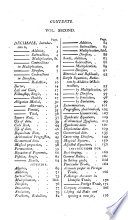 | Paul Deighan - Arithmetic - 1804 - 504 pages
...three of the following terms being given, the reft may be found. * Th Iftr"1"'! ca^ec* tne E*tr«nes. 3. The Number of Terms, 4. The Ratio. 5. The Sum of all the Terms. Any three numbers in geometrical progreflion will form an analogy, by making the confequent... | |
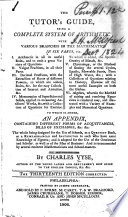 | Charles Vyse - Arithmetic - 1806 - 342 pages
...10. 6X2=2+ 10=12 and 6X2=4+8=12. In Arithmetical- Progression there are five Things to be observed, viz. 1. The first Term. •2. The last Term." 3. The Number of Terms. 4. The common Excess or Difference. 5. The Aggregate Sum of all the Terms. Any three of which being given,... | |
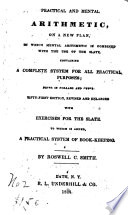 | Roswell Chamberlain Smith - 1814 - 300 pages
...Progression there are reckoned 5 terms, any three of which being given, the remaining two may b* found, viz. 1. The first term. 2. The last term. 3. The number of terms. 4. The common difference. 5. The sum of all the terms. Tht First Term, the Last Term, and the Number of Tema,... | |
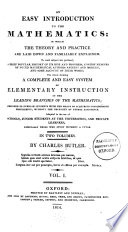 | Charles Butler - Mathematics - 1814 - 540 pages
...progression ; namely, 1. The least term, •> „ , _ _. > called the extremes. 2. The greatest term, J 3. The number of terms. 4. The ratio. 5. The sum of all the terms. Any three of these five being given, the remaining two may be found, as follows. 296.... | |
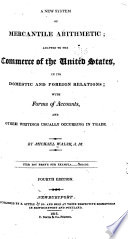 | Michael Walsh - Arithmetic - 1816 - 288 pages
...2X32=4X16=8X8=64. In Geometrical Progression the same five things are tp be observed as in Arithmetical, viz. .]. The first term. 2. The last term. 3. The number of terms. 4. The equal difference or ratio: . , 5. The sum of all the terms. NeTE. As the last term in a long series... | |
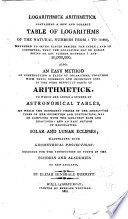 | Arithmetic - 1818 - 264 pages
...EXTREMES. Any three of the five following terms being given, the oth^p two may be readily found. ' ', 1. The first term. . . 2. The last term. 3. The number of terms. 4. The comtnpn difference. 5. The sum of all the terms. PROBLEM I. The first term, the last term, and the... | |
 | Daniel Parker - Arithmetic - 1828 - 358 pages
...cube, and other roots proved ? ARITHMETICAL PROGRESSION. THERE are fire particulars to be observed in Arithmetical Progression, viz. : — 1. The first...term. 2. The last term. 3. The number of terms. 4. The common difference 5. The sum of all the terms. Any three of the foregoing being given, the other two... | |
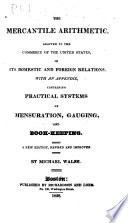 | Michael Walsh - Arithmetic - 1828 - 312 pages
...4X16=8X8=64. In Geometrical Progression the same five things are to be observed,, as in Arithmetical, viz. 1. The first term. 2. The last term. 3. The number of terms. NOTE. Aa the last term in a long series of numbers, is very t«. dious to come at, bj continual multiplication... | |
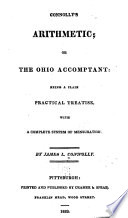 | James L. Connolly (mathematician.) - Arithmetic - 1829 - 266 pages
...2x32 = 64, and 4X16 = 64. The five things in arithmetical progression are to be pttstrved here also. 1. The first term. 2. The last term. 3. The number of terms. 4. The common difference, or ratio. 5. The sum of all the terms. As the last term, in a long series of numbers,... | |
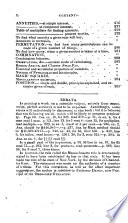 | Frederick Augustus Porter Barnard - Arithmetic - 1830 - 308 pages
...Arithmetical Progression. Any three of the five following terms being given, the other lico may be found. 1. The first term. 2. The last term. 3. The number of terms. 4. The ratio. 5. The sum of all the terms. 1. A man bought 5 sheep, giving $1 for the first ; $3 for the second ; $9 for the third,... | |
| |